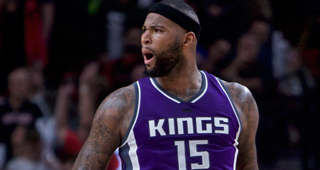Hardly anyone chooses Sacramento. The notion that there are four or five American cities worth living in is elitist hooey, but they don’t write songs about the Kings’ home. It doesn’t exist in the popular imagination as anything more glorious than a smallish NoCal river town that happens to have a governor’s mansion. That’s not enough to attract people away from their regional Sacramentos—their Memphises, Baltimores, and Kansas Cities. People go to Washington or San Francisco. They’re deposited in places like Sacramento, like a hunk of silt is by a river: there was a job opportunity, or they were born there.
Being drafted by an NBA franchise is something like both of those things. You’re at once admitted and conscripted into a grand and exclusive club. You get to walk through the door, but your seat is assigned. All things being equal, half the league would want to play for the Lakers or the Knicks, which is why the draft exists: to put players in places they wouldn’t otherwise like to be. Bird Rights and the freshly penned Durant Rule—which makes re-signing way more lucrative for the league’s stars than switching teams in free agency—are meant to keep those players around.
DeMarcus Cousins is 26 years old. It took him six-and-a-half years to get out of Sacramento. You know what they put him through: zero winning seasons, a slew of botched lottery picks, several very stupid trades. The best player he ever played with was probably a pre-stardom Isaiah Thomas, who was shipped out in a sign-and-trade and replaced by Darren Collison. Management fired Boogie’s favorite coach midseason for reasons that were never properly explained. They kept acquiring paint-clogging centers. It was a mess. Stories abounded about a front office at odds with itself—statheads and old schoolers clashing, with no proper hierarchy in place to resolve internal conflicts. Vlade Divac is a franchise legend and a swell guy, but he doesn’t appear to know what he’s doing as the team’s ostensible chief of personnel. Vivek Ranadive is a meddling punchline.
So it makes sense that the Kings got their lunch eaten once they finally decided to let Boogie leave. You wouldn’t bet on these folks to nail it. They misread the market, or read it perfectly in the sense that they knew they were screwed—no leverage, dealing damaged goods. Perhaps Ranadive has a strange affection for Buddy Hield. That seems deeply Kings-ish. They’re an organization of doomed men convinced they’re not panicking, huddled in front of a whiteboard, talking themselves in false solutions that are just going to worsen their predicament.
Why would you want to put up with these people? You wouldn’t, and DeMarcus Cousins didn’t. He was a jerk about it, and this is what’s a little complicated: he was a jerk because he is kind of a jerk—temperamental and prone to bouts of howling unprofessionalism—but also because his situation was a constant source of rage. He and the Kings were locked in a room together for too long and continually hurt each other. Fans and media folks picked their sides, heroizing Boogie or tut-tutting his misbehavior and citing the Kings’ poor decisions, but really, there were no winners, only unpleasantness.
The crucial difference between the two parties is the fact that Boogie is an immensely skilled athlete capable of thrilling us and the Kings are just a name on a jersey—a combination business venture and luxury yacht wrapped in some black-and-purple iconography that only faintly means something because Chris Webber and Jason Williams balled under it once upon a time. Tom Ziller, the NBA media’s foremost permanently bummed out Kings fan, has taken to calling owners franchisees. The term applies even to Mark Cuban and Peter Holt, who are at least as fortunate as they are good at what they do, but it describes an important aspect of the Boogie-Kings relationship especially well: one had the privilege of employing the other. Even if the relationship was difficult at times, the Kings made a lot of money off DeMarcus Cousins. That franchise value ticks ever-upward. Boogie, meanwhile, suffered in a hell that was mostly the Kings’ creation.
That hell will persist, more irrelevantly than ever, because there’s now no one left on the Kings to care about, at least until they ensnare some other promising talent, which they had better do in one of the next two upcoming drafts—they shipped their 2019 first-rounder to the Sixers a couple summers back. There’s a lot to analyze here and there isn’t: the Kings will be lousy and hapless until Ranadivé either sells the franchise or hires better executives and buzzes off. It’s hard to build a competitive team in Sacramento, let alone a title contender, but it’s impossible to build a title contender anywhere if ownership is incompetent.
For DeMarcus Cousins, here’s his liberation. The Pelicans haven’t been much more able than the Kings in terms of flanking their star big man with talent and their ownership situation isn’t exactly stable, but one great trade has given them a new start, save for a couple medium-awful contracts (Omer Asik, Solomon Hill) clogging some of their cap space. They’re half-decent already and will have some flexibility to remake the team around Boogie and Anthony Davis this summer.
This is Boogie’s chance to prove he was mistreated more than misbehaving as a King, and that, with some help, he can win a bunch of basketball games. He hasn’t chosen New Orleans any more than he chose Sacramento, but this is a situation in which he can presumably do some fine work. For the first time in his career, he’s gotten what he wants. He’s been wasting time and having his time wasted and now has an opportunity to make something of it, to not feel stuck in a place he didn’t ask to live in.



